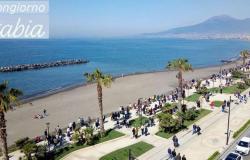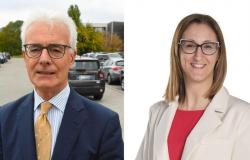“Piedmont, thanks to the European project which involves the crossing of our territory of 2 transnational corridors (Genoa-Rotterdam and Lisbon-Kiev), has a great opportunity for development. Today there are two possible scenarios. Simply being “crossed” by these infrastructural networks, leaving the production and employment opportunities to France, Portugal or other regions of Northern Italy, or believing in their creation, working immediately to identify areas and infrastructures of the second level, essential to connect the many realities of Piedmont, even the most peripheral and marginal ones, compared to the areas crossed by the corridors”. Thus begins the general secretary of CISL Piedmont, Luca Caretti, introducing the morning discussion with the candidates for the presidency of the Piedmont region promoted by the trade union organization at the Concord hotel in Turin.
The participants in the comparison
Alberto Cirio for the centre-right, Giovanna Pentenero for the centre-left and Sarah Disabato for the 5 Star Movement expressed their ideas and proposals on road and railway networks, logistics hubs, IT networks, energy networks and above all they were called to express what role they believe they should have and what development model is useful for maximizing results for the community.
The Logistics and Infrastructure Community
“In this context, Caretti immediately underlined, 2 factors are priorities for us: the first is the sharing, with the region and businesses, of a development model capable of generating quality work and increasing protection (safety, training and integrative welfare); the second is the creation of a new “space” for discussion and decision which we could call “Logistics and infrastructure community” where public companies, businesses, trade unions and institutions, in a participatory way, share political visions and strategic choices for the strengthening of the sector, with the aim of generating economic, employment and environmental benefits for our region”.
The candidates present were able to discuss specific data presented by the researcher Sergio Maset to whom the CISL commissioned a study on the topic “Infrastructure, Technologies and competitiveness – emerging elements for Piedmont”. It can be deduced that Piedmont presents a notable difference compared to the other large regions of the centre-north in terms of labor productivity, attributable at least in part to a lower presence of advanced tertiary activities. In this context, the infrastructure system must be evaluated on multiple dimensions: road and railway networks, logistics nodes, IT networks, energy networks. The development of these assets, the study shows, is accompanied by the significant presence of innovative tertiary sectors, the knowledge economy: research and development, organizational consultancy, digitalisation and IoT (Internet of Things)
The nodes of development
Some key issues arise from this that concern the relationship between infrastructure and economic development of the territory:
• Third Crossing: considering that many logistics areas have already been organized around Milan, what is meant in practice by Genoa’s role as a rear port for the south-east quadrant, not only as a stopping point or rail-road exchange point, but in terms of platform logistics and production?
• Turin-Lyon: what are the interventions that are intended to be planned and implemented to ensure that Turin is not bypassed (for example by Milan or Lyon), but instead becomes a node of the Mediterranean Corridor, where it is possible to access systems of skills and services that do they serve to create jobs and value?
• Strategic secondary axes: What infrastructural and non-infrastructural interventions will be necessary to increase the accessibility and competitiveness of marginal areas, not directly crossed by large corridors, but home to important productive, agricultural or tourist functions (mountain areas, Alpine foothills, Cuneo area)?
Disabato: “Do not address emergency issues and work on what already exists”
According to Sarah di Sabato, the real issue concerns always addressing issues in emergency situations instead of focusing on planning. In particular maintenance, hydrogeological instability, safety: all issues that should be addressed through an integrated system of measures that aim to preserve the current heritage before starting new works which in any case have reason to exist only if they are useful and strategic to the territory. Disabato also underlines on the tav, “the fact that the project has changed so many times indicates that the M5S was right, there was little foresight”. And then a jab at the outgoing council: “From those who fill their mouths with new works we have only seen cuts. Today the actions are on paper, there is inconsistency: those who propose new things but leave things suspended”
Cirio: “The task of politics is to ensure that things happen”
“We managed to mend the gap that existed with respect to the other regions of the North, in particular the north-east. Today the situation is changing and if there are good prospects the reason is the infrastructure: today we are the heart of Europe, Piedmont has opened up. There is an infrastructure system that Piedmont has put back on its feet, underlined Cirio, listing the works carried out, from the Pedemontana to the Turin-Caselle train: “The economic system is also moving because the two things, economy and infrastructure , are intimately connected and now our task in the coming years is to continue to monitor day by day and be central to the politics of our country”
Pentenero: “To attract businesses we must create an ecosystem”
“I have the impression that today the Region has problems carrying out its planning role”. This is the underlying theme of the reasoning of the centre-left candidate who underlines how in order to attract companies it is necessary to create an ecosystem that starts from transport, passes through infrastructures and staff retraining aiming at new professionalisms: “Otherwise we do not offer what the current situation requires.”
Instead, he observes, resources on infrastructure have decreased, “there are parts of the territory that struggle to connect with Turin and vice versa”. A proposal? Free transport up to the age of 25: “It would also be a good reason to attract young forces.”
The judgment of the secretary Caretti
“The theme of infrastructure is central: in light of the many crises that are emerging, connections become central to attracting new businesses to Piedmont that can create development, wealth and employment. We are satisfied with today’s meeting because we put the issue back at the center of political discussion and above all it is shared by all as a central issue for which we expect that in the first hundred days the Logistics and Infrastructure Community table will be convened in which they will be discussed the themes that were analyzed today”






